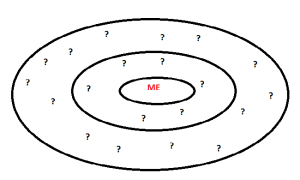 I’ve been thinking again about Cath Ellis’s blog post encouraging #rhizo14 participants to read D&G in the original and wondering if it really matters what an original meant when they wrote something, or whether it’s what it inspires in others that is important. Serendipidously I found I’d bookmarked this Beginner’s Guide to Deleuze which says that he:
I’ve been thinking again about Cath Ellis’s blog post encouraging #rhizo14 participants to read D&G in the original and wondering if it really matters what an original meant when they wrote something, or whether it’s what it inspires in others that is important. Serendipidously I found I’d bookmarked this Beginner’s Guide to Deleuze which says that he:
… is concerned, not with what a given text “really” means, but rather with what can be done with it, how it can be used, what other problems and other texts it can be brought into conjunction with.
Dave made a similar remark in the Facebook group about not caring less when purists accused him of misinterpreting D&G. I used to have similar conversations with Ray Monk when I was an undergrad. I’d mention a bit of Wittgenstein and say that it made me think of X, and Ray would say “ah, yes, but of course he meant Y”. Ray was a kind, erudite man, and he taught me an awful lot about Wittgenstein, and I don’t wish to malign him or suggest that he was a pedant, because that would not be true.
So where am I going with this? Well, it’s tricky. I do think that it is important not to misrepresent what authors are saying, and it infuriates me when folk paraphrase poorly because they have not understood what they have read or not bothered to read the primary sources. I always try to read things for myself in the original context if I am going to use them in my writing and, as an academic I think that I should do this whenever I can.
But I also think that it is absolutely fine to take a piece of writing that inspires you and to use it as a springboard for your own ideas. As long as we distinguish, as well as we can, between Deleuze’s ideas and Deleuzian ones, I don’t see a problem. Here’s one of my many favourite Wittgenstein quotes, by the way:
 “Uttering a word is like striking a note on the keyboard of the imagination.” Wittgenstein, Philosophical Investigations, Section 6
“Uttering a word is like striking a note on the keyboard of the imagination.” Wittgenstein, Philosophical Investigations, Section 6
I think that D&G, like Wittgenstein and Nietzsche, write in a style that encourages tangential use of their prose.
Writing has nothing to do with signifying. It has to do with surveying, mapping, even realms that are yet to come. D&G A Thousand Plateaus pp 4-5
I also think, as I’ve said before, that it is perfectly fine to talk about D&G’s metaphors without having read their writings. The rhizome is a metaphor from botany, and you don’t need a PhD in philosophy to understand that!
A more radical position was suggested to me by Steve Draper recently. Steve’s one of the brightest, well-read people I’ve ever had the good fortune to know, so when he suggested that I read Pierre Bayard How to Talk About Books You Haven’t Read I laughed. I’m reading it, though, and it is very good. More about that later.
 I’ve been thinking a LOT about different ways of representing the rhizome recently. D&G talk a lot about nomads living in smooth space and making felt (not knitting!) and I wondered what they’d be listening to during all of that. A quick search of Soundcloud (thanks Frances!) found 381 tracks, 47 people, 33 playlists, and 2 groups, so that’s my listening sorted out for a while then.
I’ve been thinking a LOT about different ways of representing the rhizome recently. D&G talk a lot about nomads living in smooth space and making felt (not knitting!) and I wondered what they’d be listening to during all of that. A quick search of Soundcloud (thanks Frances!) found 381 tracks, 47 people, 33 playlists, and 2 groups, so that’s my listening sorted out for a while then.










